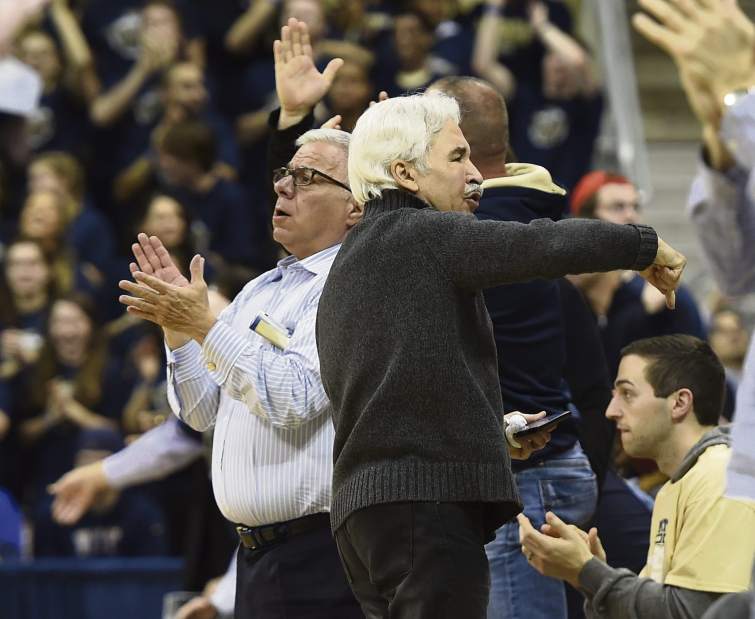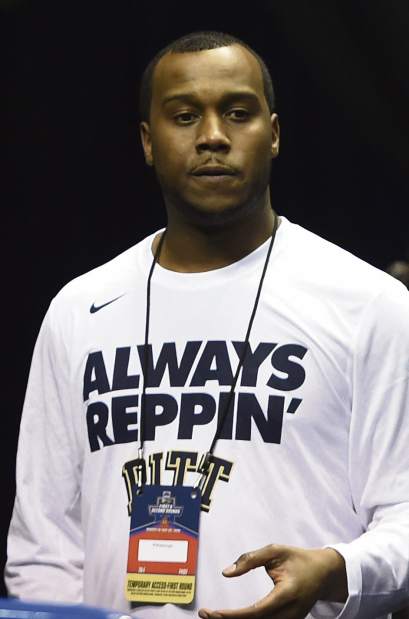These guys give Pitt athletics (financial) boost
Befitting a man who runs a department with 19 sports and a $59 million budget, Pitt athletic director Scott Barnes usually commands a room with his words and presence.
About nine months ago, however, he was at the Duquesne Club just to listen.
It was one of Barnes' first days on the job, but he prioritized a June breakfast with two Pitt donors, Dr. Mark Duca and Patrick A. Gallagher, CEO of Monaca-based PGT Trucking (no relation to Pitt chancellor Patrick D. Gallagher).
Duca, Gallagher and boosters like them are important cogs in the athletic department, providing significant financial support for multimillion dollar facilities and projects. They have the ear of chancellor Gallagher and the friendship of prominent coaches such as Pat Narduzzi and Jamie Dixon. Booster Sammie D'Agostino, for instance, spoke frequently with Dixon between the end of the season and Monday, the day Dixon resigned.
They can be found at home and away games. Some have standard courtside tickets for basketball games. One booster who wished to remain nameless offers his private jet for athletic department VIPs and coaches for recruiting purposes.
These high-rollers carry clout. But don't think they had a say in Narduzzi's hiring a little more than a year ago or who the next men's basketball coach will be.
D'Agostino said boosters have no role in hiring coaches.
“Absolute zero,” said D'Agostino, who admitted to a recent casual conversation with old friend Sean Miller, the Arizona coach who eliminated himself as a candidate one day after Dixon left.
“As far as Scott reaching out to anybody, that's not the case,” D'Agostino said. “We all like Scott. We're certainly friendly with Scott, but that's not his style. I wish it were more, but it's not.”
Boosters aren't policy makers, but that didn't matter to Barnes during that introductory breakfast. He wanted to hear what was on their minds.
“Scott did a lot of sitting there and listening more than he actually said anything,” said Duca, a Steelers team physician who spends autumn Saturdays in the stands cheering for Pitt and Sundays on an NFL sideline.
What Duca especially liked about Barnes was this: “He looked you in the eye.”
Coupled with Narduzzi's ability to make friends and Barnes' willingness to listen, Duca said he believes outside support for Pitt athletics has reached levels rarely seen.
“I don't want to speak for (Narduzzi),” he said, “but I think he really feels he has the support here for everything he needs to accomplish to be competitive.
“I don't think you could ever say coaches could say that before.”
D'Agostino believes the recent strengthening of the bond among fans, donors, the administration and coaches will lead to a football program with more durability than what Pitt experienced at the outset of this decade.
“Narduzzi has embraced the culture here,” he said. “If he's just here for a stopover, he's the best actor ever.”
Chancellor Gallagher has done his part, increasing football salaries when Narduzzi was hired 15 months ago. He also authorized a $4 million renovation of Pitt's South Side football facility, completely paid for by donors.
Some get their names attached to the buildings they help build. Take James Duratz, for example, whose donation led to the Duratz Athletic Complex on the South Side and several endowed athletic scholarships.
The $29 million, 12.32-acre Petersen Sports Complex — named after benefactors John and Gertrude Petersen, who also contributed $10 million toward Petersen Events Center — houses the baseball, softball and soccer teams on Pitt's upper campus. Fields are named after donors Charles L. Cost, a former Pitt running back from the 1950s, and Pitt alumnus Nishan Vartabedian and family. Funding for the Ambrose Urbanic soccer field came from an anonymous donor. Armand C. Dellovade donated the scoreboard on the Cost baseball field.
“They are vital, not only with their moral support and traveling and buying tickets and bringing people to our events, but their financial contributions are invaluable,” said Pat Bostick, a former Pitt quarterback and the athletic department's director of development. “We would not be able to provide the kind of student-athlete experience and the scholarships we offer without their annual support, and they continue to step up.
“Folks across the board step up when we have any kind of initiative.”
Barnes was unavailable for comment.
Boosters also offer support in other ways. D'Agostino and friends seldom miss a football or basketball game even when weather conditions would suggest it's best to stay home.
D'Agostino likes to tell of the time he and longtime booster Jim Barber (center court at Petersen Events Center, every game) were returning from a loss at Notre Dame. Their car slid on ice sometime in the middle of the night on the Ohio Turnpike.
“The car did complete circles on the highway,” D'Agostino said. “We lost the game. That was worse than the circles.”
D'Agostino shamelessly recalls running into basketball official Dick “Froggy” Paparo in the men's room at the airport in Lincoln, Neb., a day after Pitt's 80-74 overtime loss to Vanderbilt in the 1988 NCAA Tournament.
“I look at the stall next to me, and Froggy was there,” D'Agostino said. “I said, ‘I know one thing: I don't know how you will be able to sleep. Go out into that hallway and look at those (Pitt players) crying.'
“I can't say what he said, and I can't say what I said. We would have won the national championship if we hadn't lost that game.”
Barber, a plastic surgeon, has been close to the basketball program for more than three decades. He provided much of the funding for the floor at Fitzgerald Field House, and he is godfather to assistant coach Brandin Knight's daughter, Kylah.
When he was doing his residency at Cedars-Sinai Medical Center in Los Angeles, Barber said he called his mother on Pitt basketball nights and had her put the radio next to the telephone. When he was in school in the nation's capital, he drove to Breezewood. The radio reception was better there.
“I call it an addiction,” said Barber, a former Pitt baseball player. “None of us (boosters) are smokers or drinkers. We are road warriors. This is like our life.”
When Duca met with Barnes, he said he didn't try to dictate policy to the new athletic director — “That's above my pay grade,” Duca said — but he did have suggestions.
“Where we need to improve, the challenges he faces at Pitt, the strengths,” Duca said. “You want to graduate kids. We want our kids to be in the sports pages and nowhere else.
“He has passionate fans. They may not be there in numbers, but you won't find more dedicated fans than what you have in this room.”
D'Agostino said the early days of Barnes' tenure have been a change from the past.
Asked if a Pitt athletic director ever had sought his opinion, D'Agostino said, “The previous one, (Steve Pederson) definitely not.”
“Scott will engage you in conversation,” D'Agostino said. “If you do have an opinion, I'm comfortable with the fact that he will take it into consideration. It's definitely more transparent.”
Duca remembers when Pitt coaches complained about being forced to use long-term parking at Pittsburgh International Airport. Now the coaches use a booster's private jet while recruiting.
“We were way behind the times when it came to that kind of stuff,” he said. “You don't hear the same grumblings (from coaches now).”
Not long after Pitt hired Narduzzi in December 2014, the coach accompanied several donors to Virginia for a basketball game. They rode on a booster's private plane. They did the same for Pitt's NCAA Tournament game March 18 in St. Louis, allowing Narduzzi to return to Pittsburgh that night and be at Heinz Field by 7:30 a.m. the next day for practice. Had Pitt won, Narduzzi said he would have returned to St. Louis for Sunday's game.
Booster Jack Tighe, who lives in Philadelphia but was a Pitt student with Tony Dorsett, once sat with Narduzzi and wife Donna at a get-acquainted event. Pitt was selling locker sponsorships for $10,000. After only one meeting, Tighe's wife suggested they buy one.
“It really revolves around the personal touch and forming relationships as much as loving Pitt,” Tighe said.
“If it's something we believe in, we will give them all the support we can,” Duca said.
Booster Ray Nepa, a financial advisor, doesn't believe in overspending but understands the climate of big-time college sports.
“If you want to compete at the highest level, there are budgetary requirements,” he said. “It's not that you have to outspend everyone in order to be successful, but you have to commit resources to make things happen.”
Jerry DiPaola is a Tribune-Review staff writer. Reach him at jdipaola@tribweb.com or via Twitter @JDiPaola_Trib.


